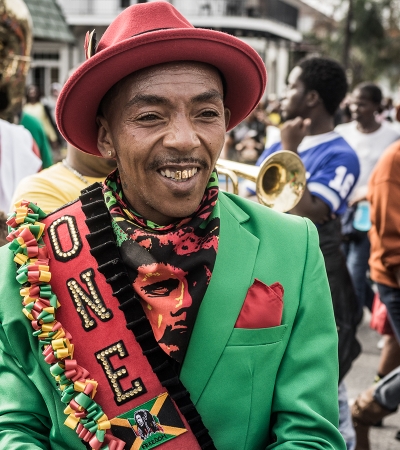To second line, it's something different, and that's what made me try. Big Chief Edgar Jacobs of the Choctaw Hunters paraded with the Big Nine. He asked me, “Why don’t you come out on the road with me for a year?” At first, all the Indians were like, "Poppa, you don't know how to second line, you just know about Indians!" I said, "Well, it's something to learn, and I'm going to learn this, too."
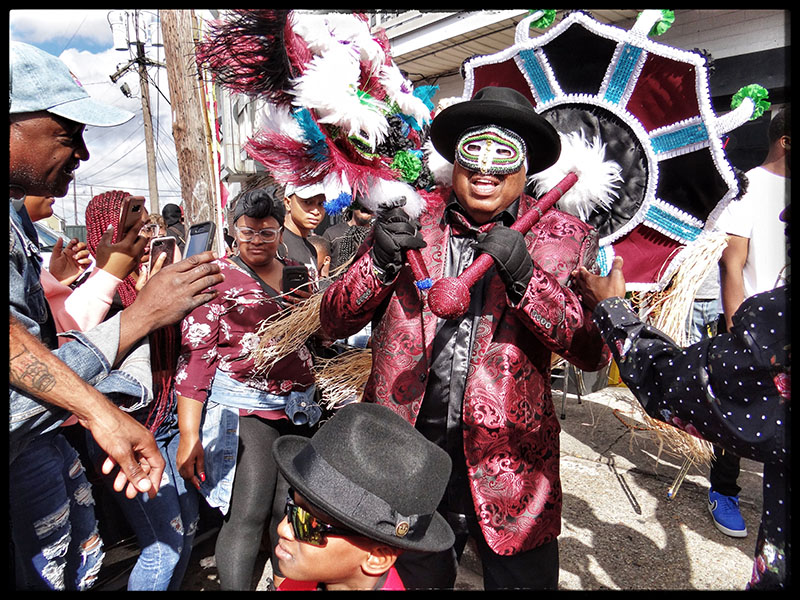
"Poppa, you don't know how! People move fast!"
I said, "All right, I'm going to show y'all."
I paraded with the Big Nine for three years. After a couple years, they said, "Poppa, you got it."
I said, "I know I'm doing it, huh? You just got to catch on to it.”
After Big Nine, I paraded with Drew Johnson and CTC Steppers for many years. In 2008, I came up with Lower Ninth Ward Steppers. The original members were Minor Wilson, Lisa Porters, Justiner Turner, my brother Durand Williams, Millet Washington, and about seven kids. Mr. Ronald Lewis and Mr. Bob Starks were good to us. They welcomed us back to the Big Nine parade as our own club. I wanted to stay in our neighborhood—the Lower Ninth Ward.
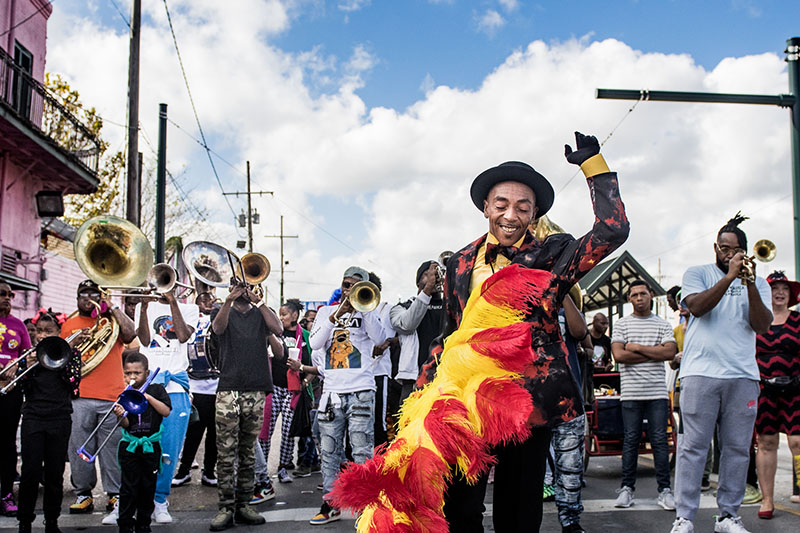
Back-a-Town
I grew up back-a-town in the Lower Ninth Ward at 1918 Alabo, just off of Claiborne Street. My great-grandmother, Helen Franklin, owned a barroom back then called the Alabo Inn. The barroom was on the bottom, and our house was on the top. I can’t remember when a church started next door to our house on Alabo. Both the barroom and the church couldn’t stay because they were too close in zoning. After two years, my great-grandmother just let the barroom go. Every Sunday, I go to the church down the street, but the church right next door, nothing’s going on. It’s a new building. They fixed it up after Katrina and everything, but nobody would come to it. No members, no nothing.
When I was small, my grandfather, Alvin Thomas, was a fruit vendor. He would be walking with the people who worked for him, talking and singing. Every day we would have fruit. My little son right now could eat nothing but strawberries all day. Grandma down the street, Mary Franklin Thomas, says, “He eat that cause his grandpa used to sell that. It’s in our blood; that’s all we do.”
I say, “That’s why they hooked on that. You keep fruits?”
She says, “I like apples.”
“I see that. You keep a jar full of apples.”
“Yeah, they can pick and choose what they like.”
For the storm, I got my grandmother and them out; I got them all out. But my grandfather and I stayed there cause we thought it was going to be nothing. Like everybody says all the time, “Here come a storm! It’s going to be this, it’s going to be that.” It really came through this time. During the storm, we didn’t have no water, but afterwards, we heard an explosion twice—boom, boom! That’s when the wall of the levee broke loose, the water got high, and flooded the neighborhood. A barge came through with the surge of water, and it just took houses out.
I was on the roof by my friend’s house and I saw a house go down North Roman Street like it had a motor on it. Yes, with people in it. People come out their roofs like, “Poppa, I don’t know where we’re gonna wind up at!” I was saying, “We’re just praying; just hoping you be safe.” When I came back after Katrina to see how everything looked, their house was parked on the corner of Roman and St. Maurice—that’s across Tupelo, six blocks down. I talked to them two months after that: “Poppa, I’m glad to talk to you.” I said, “I’m glad to talk to y’all! Y’all passed me up in a house that was moving! If y’all hit anything, the whole house could have just crumbled.”
Katrina was nothing nice for nobody. I stayed four days through the storm on the roof. The first day they came with a helicopter. They dropped a basket to get you, and I didn’t want to get in it. I told them no, I’d wait another day for the boats to come. They came and brought us to the St. Claude bridge. We couldn’t go to the Claiborne bridge because they were bringing all the deceased bodies over there. We got off the boat and walked over the bridge. Stayed at the Convention Center for three more days, then got on a helicopter from there to go to Corpus Christi, Texas. I wound up in Arlington, Texas and that’s when I met up with my mama, my grandmama and them.
We’ve got two family houses right now—my great-grandmother’s and my grandparents’. When we came back, they was gone. Completely wiped out. At first, my grandmother didn’t want to come back, but her mother talked her into it. We didn’t come back with the barroom though. She just came back with a straight house. My great-grandmama passed away, but my grandmother is still down the street. I stay at the house at 1918 Alabo.
An Open Door
One day when I was growing up, my lil partner Victor and I were running in the back yard chasing chickens, and we saw a back door open. A man was sewing, and he caught my eye: "Sir, what is that?"
"That's how you mask Mardi Gras Indians. That's how you make the suit. Now, I'm here if you want to learn." I said, "All right. I'll come back next week." He might've thought I wasn't going to come back, but I did. His name was Mr. Aaron Brown, and he masked as flagboy with the Choctaw Hunters.
Mr. Aaron said, "So you really want to learn!"
I said, "Yeah. It's something different than just running around. It's something I can do.” I caught on to it, and that's what I've been doing. Every day. Sewing Indian suits. Everything is hand stitching.
I started masking with Big Chief Edgar Jacobs and the Choctaw Hunters with Willard “Wildman Shorty” Walker and them. And then Big Chief Rudy, from the Ninth Ward Hunters, liked my style. He’s like, "Oh, why don't you come mask with me?"
I said, "I'll come mask with you." I masked with Rudy for around three years. When Nelson Burke and them left Ninth Ward Hunters to start Red Hawk Hunters, I masked with them. I stopped masking, but my son, Anthony, has been doing it since was five years old, and he’s 13 now. Since Katrina, Nelson stays in Atlanta, and Alphonse “Dowee” Robair started a new gang, Black Hatchet.
On Mardi Gras day, I’ve got my thread and needle. People ask, “Why you carrying that around in the parade?” I say, ''Cause you don't know who all coming loose. And it’s not going to be my work, either!” Next thing you know, “Poppa, you got this?”
"Yeah, I got that. Come on over here, I gotcha.”
“Poppa you got the staples?”
“I got that, too.”
Organizing a Parade
From years of sewing suits, I learned how to keep everything in my head. I’ve got to. If I don’t, I’ll be lost. I use the same organization with the Lower Ninth Ward Steppers. I do all of the design work for our club. Our parade date comes at the end of the year, so I focus on getting everybody measured, ordering the suits, and then I can go back to the sewing for Mardi Gras.
When you lead a social and pleasure club, people may think you're there to get money out of them. But no, it's not that—it's a non-profit club. I say, “I'm not here to get over on you. You’re here trying to have fun just like I'm here trying to have fun. When we go as a group, the price is going to come down.” You're not going to buy a shoe for $650, and he's not buying a shoe for $650. No, put all the money together, and the shoe might come down to $400.
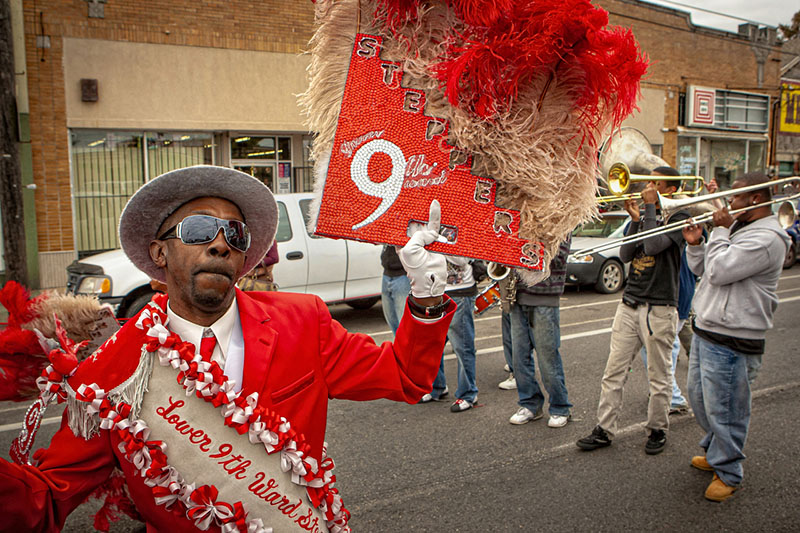
When I was dancing in the CTC, Mr. Kevin Dunn did all their work. I paid attention to what he did. When he sees me, I say, “I know Mr. Dunn, I got something off you, bruh.”
He says, “Ain’t nothing wrong with that. I love for someone to learn it. That's what I want. I'm looking for somebody out here to pick this up.”
The feathers I get from the Indians. After they mask that year, I’d say, “Look, let me buy these feathers from y'all cause I know that's what my club's going to want for next year.”
“Alright, bruh, we got ya.”
In the second line last year, we came out in a fire theme.
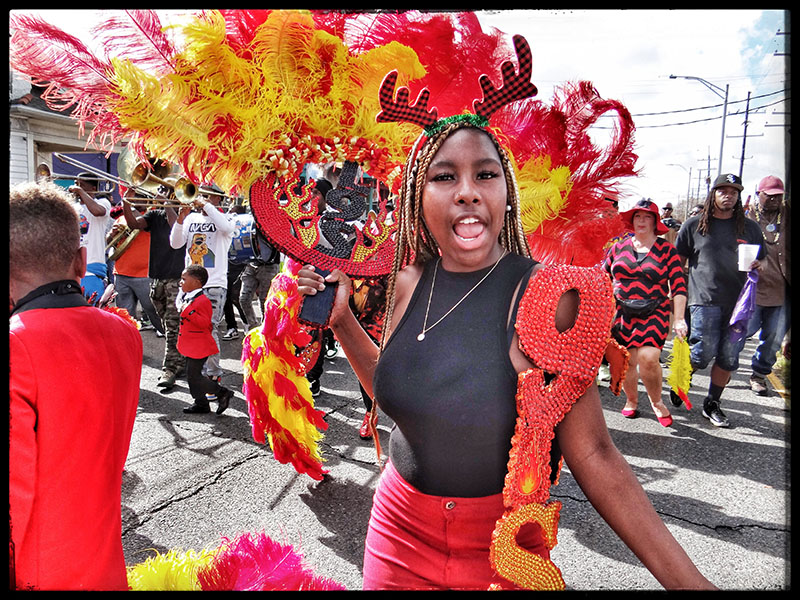
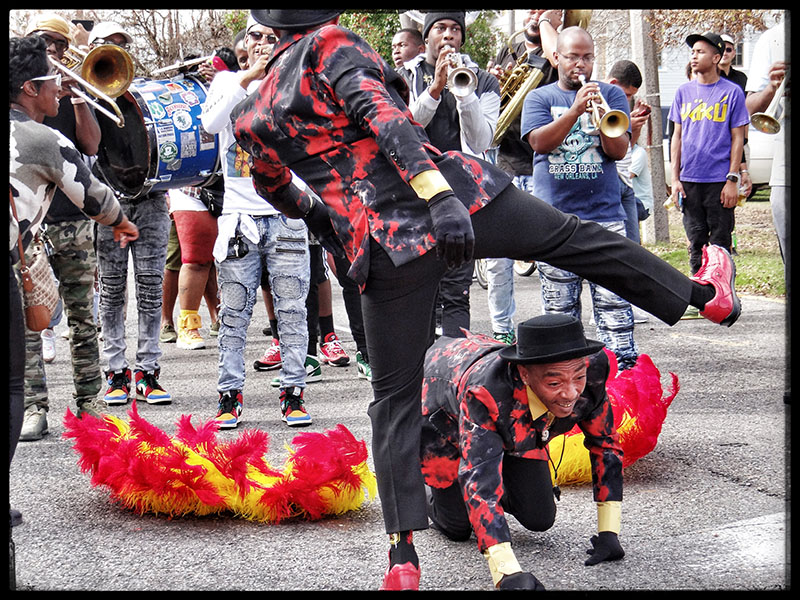
It's Christmas time, so we try to make it look like it's Christmas. We like to keep our eye on the season like the Pigeon Town Steppers do with Easter. Every Sunday, when we go to the parades, we have on a different shirt. We might have the pants or shoes to match it. I enjoy designing them for us, and people have been checking us out. They love us.

